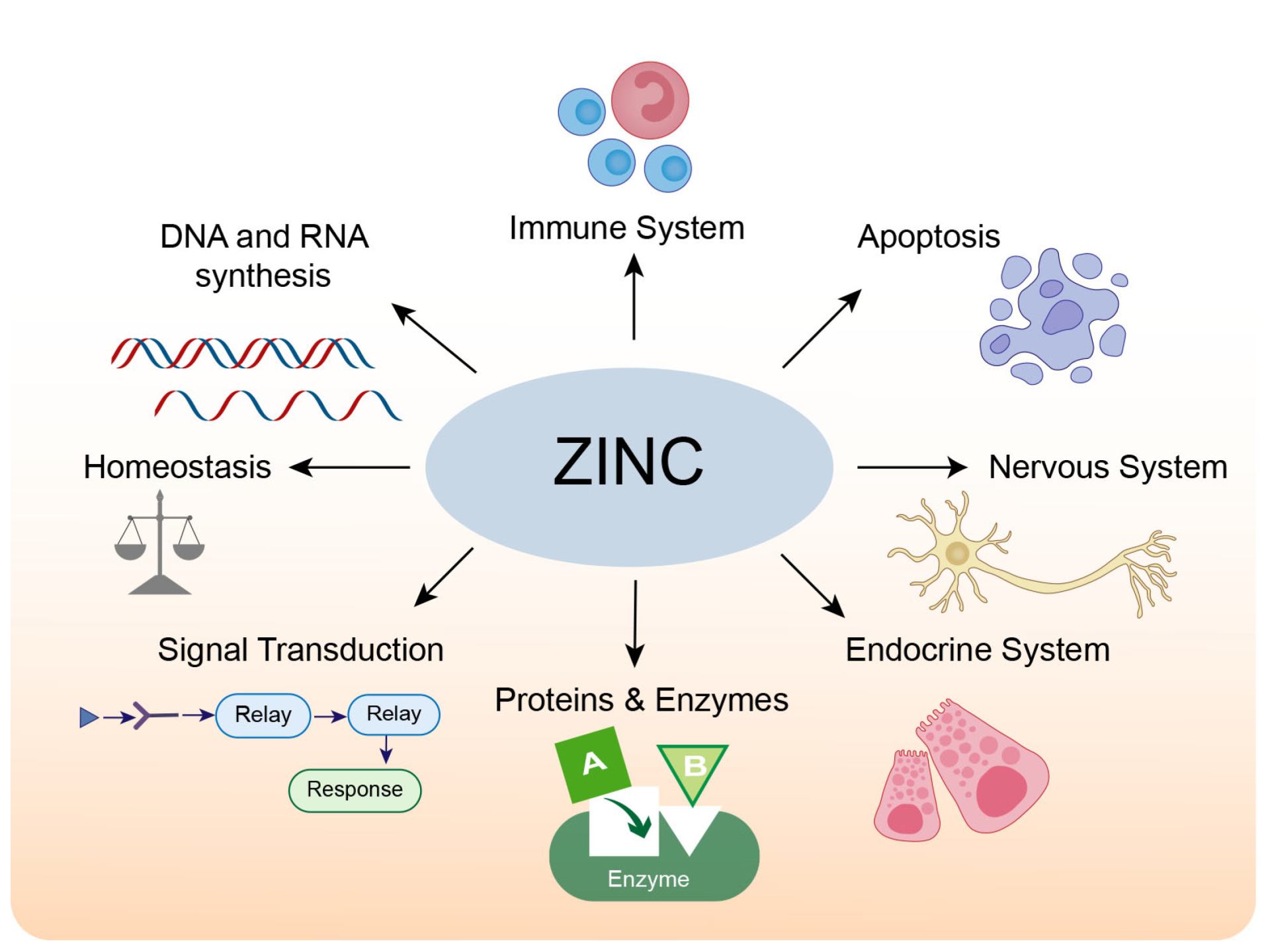Zinc is one of the most important trace elements necessary for maintaining human health. It is involved in more than 300 enzymatic reactions, regulating gene expression, and supporting immune function. It plays a critical role in numerous biological processes, including cell growth, differentiation, and the functioning of the immune system.
Zinc is essential for the proper functioning of the immune system, wound healing processes, cell division, and DNA synthesis. Zinc is also important for maintaining the sharpness of taste and smell.
Moreover, this trace element affects blood insulin levels, participates in carbohydrate metabolism, and supports normal nervous system function.

Health Benefits
Immune System. It helps the body fight infections and speeds up wound healing.
Bones. This mineral actively participates in the mineralization of bones, making it important for bone tissue health.
Taste and Smell Perception. Zinc deficiency can lead to a decrease in these senses, which significantly affects quality of life.
Treatment of Various Diseases. For example, it may be effective in treating colds and some skin diseases such as eczema.
Antioxidant Properties. It helps protect cells from oxidative stress, which may reduce the risk of chronic diseases.
Sperm Quality. Studies show that adequate zinc levels are associated with improved fertility in men.
Eye Health. It helps prevent age-related macular degeneration and other vision problems.
Daily Requirement
The daily requirement for zinc varies depending on age, sex, and physiological condition.
For adult men, the recommended dosage is 11 mg, while for adult women it is 8 mg. Pregnant and breastfeeding women require an increased amount of zinc — up to 11-13 mg per day.
Possible forms and their learnability
Nutrient forms are listed from best to worst:
Options on iHerb:
| Product | Price, $ |
|---|---|
| 9.62 | |
| 9.97 | |
| 2.88 | |
| 9.86 | |
| 5.00 | |
| 5.63 | |
| 2.58 | |
| 4.13 | |
| 19.01 | |
| 17.26 |
Options on iHerb:
| Product | Price, $ |
|---|---|
| 11.45 | |
| 9.36 | |
| 18.22 | |
| 14.38 | |
| 13.41 | |
| 18.22 | |
| 6.71 | |
| 12.09 | |
| 3.94 | |
| 6.06 |
Options on iHerb:
| Product | Price, $ |
|---|---|
| 6.84 | |
| 5.93 | |
| 8.49 | |
| 14.38 | |
| 12.45 | |
| 6.21 | |
| 7.28 | |
| 10.47 |
Options on iHerb:
Options on iHerb:
Options on iHerb:
| Product | Price, $ |
|---|---|
| 24.27 | |
| 25.57 | |
| 15.47 | |
| 24.66 | |
| 16.08 | |
| 24.65 | |
| 12.47 | |
| 11.97 | |
| 23.37 |
Health Consequences of Deficiency
Zinc deficiency can reduce the body’s ability to regenerate tissues and heal wounds, as well as affect the normal development and functioning of the reproductive system.
Other consequences of zinc deficiency include an increased risk of infectious diseases, slowed growth and development in children, deterioration of skin, hair, and nails, as well as possible disturbances in taste and appetite.
Psychological symptoms include decreased attention span, depression, and apathy, which are directly related to the critical role of zinc in neurotransmission.
Risks of Excess and Toxicity
Zinc toxicity usually manifests as gastrointestinal disorders, headaches, and fatigue, and can lead to more serious consequences, such as suppression of immune function and imbalance of other important trace elements in the body.
According to the National Institutes of Health (NIH), the upper intake level for zinc for adults is 40 mg per day.
Taking zinc in doses exceeding this limit may lead to copper deficiency, as excess zinc interferes with the absorption of copper by the body.
Additionally, consuming more than 50 mg of zinc daily for several weeks may cause negative effects, including a decrease in “good” cholesterol (HDL) levels and changes in immune system function.
Dietary Sources on a Keto Diet
To maintain zinc levels on a keto diet, it is essential to include foods rich in this element. Excellent sources of zinc include:
- Meat: beef, pork, lamb.
- Seafood: oysters and crabs rank among the highest in zinc content.
- Pumpkin seeds: an ideal snack option that not only supports zinc levels but also enriches the diet with healthy fats and fibers.
Other good sources include flaxseeds, hard cheeses, and eggs.
Interesting Facts About Zinc
Discovered in 1746. Swiss alchemist and mineralogist A. C. M. Bergman was the first to isolate zinc in pure form, although the metal had been used long before in various alloys and jewelry.
Important element for the growth and development of children. It is necessary for normal cell growth and contributes to brain development in children.
Alcohol abuse. Alcohol affects zinc absorption and can lead to its deficiency.
Skin health. It is used in various creams and ointments for treating acne and other skin diseases due to its anti-inflammatory properties.
Plant sources of zinc are less bioavailable than animal sources. Phytates found in grains and legumes can bind to zinc and hinder its absorption.



























































